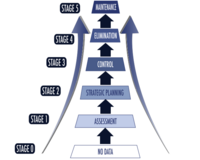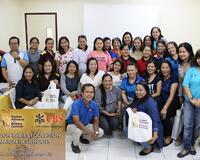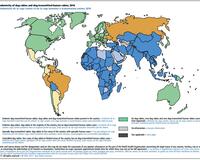Newsletter Issue 52
April, 2017
GARC News Articles

Editorial: Strengthening the Stepwise Approach towards Rabies Elimination (SARE)
The Stepwise Approach towards Rabies Elimination (SARE) is a key initiative to simultaneously acknowledge the complexities of rabies control and to develop a process framework that would make rabies control programs more manageable and effective.

Maximising the reach of the REC through veterinary schools
In the Philippines, the GARC online education tools are being integrated into some veterinary college curricula. Here we share two stories about how the skills of students are being boosted so that they can participate more confidently in rabies education and vaccination in their communities.

1st Meeting of the Regional Rabies Focal persons in East Africa
The Panel of Rabies Program Directors of the Americas (REDIPRA) has proven very successful in moving forward rabies control and elimination activities across Latin America. Based on this success, the idea was conceived to develop similar structures for various sub-regions in Africa.

Communicating rabies information whilst supporting schools
In celebration of Rabies Awareness Month in the Philippines this March, GARC and the Department of Education (DepEd) are collaborating to include a rabies information campaign as part of the Brigada Eskwela Program for school

What factors affect a rabies control program costs?
A recent article by Elser, et al. in Transboundary and Emerging Diseases provides a helpful analysis of the cost variability involved with expanding or implementing rabies control programs.
Community News Resources

Veterinary leader strives for a rabies-free state in the Himalayas
To share what inspires those involved in the effort to eradicate rabies, we are taking a closer look at the work and the lives of some of the winners of the World Rabies Day MSD Animal Health Award from 2016. This issue we focus on Dr. Thinlay N. Bhutia, who has spent his career working towards a rabies-free state in his Himalayan home of Sikkim, India.

The last mile for rabies elimination in Latin America
There is no doubt that the regional program for rabies elimination across Latin America has been a success. Yet the last mile is always the hardest. No less than four different dates for the elimination of rabies have been set and each one missed. Why is this?

Collaboration strengthens canine rabies control in Guatemala
The Universidad del Valle of Guatemala (UVG), CDC-Central America Region Office, and the Centers for Disease Control and Prevention (CDC) have collaborated for several years to enhance surveillance and improve the current understanding of rabies risk in Guatemala.
Response to “A better way forward for rabies control in India?"
Dr Andrea Britton, Dr Helen Byrnes, and Dr Thinlay Bhutia comment on a GARC newsletter article from the last issue which described the Tamil Nadu rabies intervention and cost-effectiveness modelling study by Fitzpatrick et al. in PNAS December 2016.

Applied research “Towards Elimination of Dog Mediated Human Rabies”
A collection of new papers brings together the experience and lessons learned from rabies control programmes small and large, research aimed at improving the design and cost effectiveness of rabies control programmes, and analysis of the resources needed to expand rabies control efforts if the global goal is to be reached.

Recent Research April 2017
A round-up of recent research relevant to GARC’s mission
Uapikun Has A Question (Uapikun kukuetshitshemu)
A new resource to teach children how to be safe around dogs has been developed for use in First Nations communities of the Labrador region of Canada.
How ethical are your rabies control efforts?
Rabies control involves many ethical issues around free roaming animals, which may not be consciously considered during planning and implementation of rabies programmes.